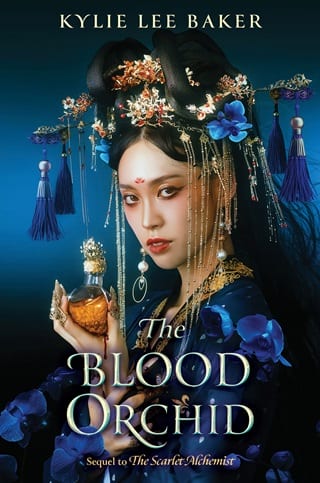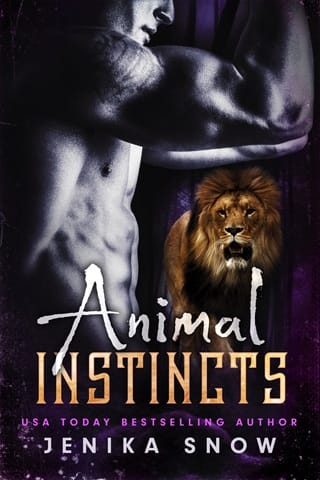Chapter Twenty-Four
I am standing in a village that no longer exists.
The sky is an unsettled gray, the taste of an impending storm on my tongue, pinpricks of cold rain over my face and open palms.
The houses of this fishing village burst like plum blossoms from the green hills, south sides hugged with moss, red lanterns
echoed in ruby reflections across the cove. It is the kind of quiet, perfect beauty that can only exist in memory.
To my left, the ocean hums. The villagers are hiding from some nameless fear, whispering behind their locked windows.
I come from a world of fierce monsters and evil empresses, and I expect a great sea beast to claw its way up to the shore.
Perhaps a creature of legends, something fearsome beyond measure.
But what happens next is much worse.
From the east, the ocean begins to rise.
As if the sea is a great blanket that someone has peeled up to peer underneath, it grows taller and taller, the dark abyss of the deep ocean yawning as it approaches. It stretches taller than the village, taller than the whole world, blacking out the gray sky until there is a lightless cage of sea overhead. And then, at last, it crashes down.
The wooden bones of the village shatter, lanterns extinguished in an instant, foam and black sea rushing toward me. Thatched
roofs are carried away, carts tumbling over themselves, children screaming before they're sucked underneath. The water seizes
me, crushes me in its cold hands, slams me against the side of the building. It drags me along the village streets until my
chest screams for air. The ocean releases me at last when a metal support beam from the roof skewers my spine, splitting me
in half.
I am lying in a field of blood, face-to-face with a dead soldier. The earth is cracked and sun-scorched beneath my palms,
trembling from hurried footsteps. Someone trips over my legs, another person stomps down on my fingers, but I barely feel
the pain because I am the earth and the roots, I have always been here, this is where I will die.
The face of the man across from me is streaked with tears that cut like white scars through blood and dirt, and I want to
look away but cannot move. I try to draw in a breath, but it gurgles in my throat. There is a spear at the base of my neck,
hot metal lodged in my windpipe, blood spilling hot and fast, wetting the parched dirt. I have died many times and know there
is never any dignity in death, but knowing is different from feeling, and in this moment I am both scorched alive by the sun
and drowning inside myself.
I am so very close to home.
It is night, and the cicadas are screaming in the tall grass around me, and there, at the end of the path, candlelight is
burning through the windows.
I clutch a handful of bayberries as I fall to my knees, then my face, unable to catch myself. The hunger is a beast that has built its nest deep in my stomach, carving me apart from the inside. But these berries were the only ones in a flood-drenched field, all I have to show for my day, and I will not eat them for all the world. Even when the pain in my stomach settles deep between my ribs, an ache that grows and grows until it consumes me, and the cicadas are so loud, they are all that I can hear, the starless sky all that I can see.
I am the fever that burns through small children at night, blooming scarlet across their cheeks, reaching in and stealing
their breath from their mouths.
I am the smoke that chokes the sky after lightning strikes, the simmering embers that devour thatched roofs.
I am the tiger's teeth as they bite down on a child so very far from home.
I am the earthquakes that rip the earth to pieces and the corpses that fall into its fresh chasms.
I am the bones of all the planets.
I am silence.
I am the end.
And at last, I am standing on golden sands, a firm hand closed around my wrist, yanking me to my feet that no longer feel
like mine, all of my bones borrowed, skin stolen.
"Zilan," a man's voice says.
And when my vision settles and I find myself kneeling in the desert, I look up at a pair of bright green eyes.
The man in front of me was a foreigner, skin pinkish and pale like uncooked jellyfish, his hair coppery under the desert sun. He said my name again, and the tones were wrong, but I understood anyway because this was a voice I had always known.
"Bàba?" I whispered.
He smiled down at me, and the sight was so new yet so familiar, and I knew even before he answered. I had died so many times
that my memory was a patchwork quilt, but I was certain that I had seen him before.
"How are you here?" I said.
He looked at me sadly for a moment, and I wondered if he didn't understand Chinese. He'd named me Zilan, after all. Only a
foreigner would give a child that name.
But his next words came in unsteady Guǎngdōng huà, my first language.
"Penglai Island amplifies alchemical power," he said. "It allows me to manifest here in ways I couldn't before."
"And where is here ?" I said.
He looked out across the sands, not unlike the desert of Lanzhou, though this one somehow felt flat, as if the world dissolved
at the edge of the horizon.
"In your mind," he said.
"Then where are you really?" I said, my fists closing in the sand. "I'll come find you."
He let out a sharp laugh, shaking his head. "I am in an unmarked grave just beyond the outskirts of Chang'an," he said softly.
I turned away, unable to bear the pitying look on his face. I had known my father was probably dead, so I wasn't prepared
for the swell of disappointment, the way my throat closed up and tears burned at my eyes. Maybe some small part of me had
always hoped that, since I had never seen a body, he wasn't truly dead. Resurrection alchemists never really believed in endings.
He took my hand, kneeling in front of me. "That is where my body is," he said, "but my qi runs inside of you, so I'm with
you as well."
He placed a hand on the inside of my wrist, feeling my pulse. Our heartbeats drummed in sync, the gentle hum of alchemy between
us like one long, unbroken river. Of course, he'd died because I'd devoured so much of his qi after he'd resurrected me, so
part of him was inside me forever. Perhaps his voice that I'd heard had never been my imagination at all, but the part of
him that still lived within my soul.
"I've been trying to reach you ever since you left in search of Penglai Island," he said, "but it's a bit hard to break through."
He waved his hand across my lap, and there were the loose sheets of his notes that I'd read over so many times as I'd tried
to retrace his footsteps. He placed a new, cleaner sheet in my hands, and I knew from the writing at the top that I had never
seen this one before.
"I had this one with me when I died," he said.
I skimmed over the unfamiliar words, then placed the paper in the sand beside the others.
This was the missing page.
I'd thought it wasn't that important, since I'd managed to find my way to Penglai Island without it, but I was wrong.
"I don't understand," I said at last, a coldness settling in my stomach despite the desert sun overhead.
He folded his hands in his lap, staring off into the pale horizon as if considering his next words.
"What did you see when you touched the source of alchemy?" he said at last.
Hesitantly, I told him about the typhoons, the war, the starving children in the fields. Once I started, I felt like I couldn't stop talking, needing to tell him about each and every instance of suffering, for keeping those moments secret inside me felt like a betrayal. Though it was only an illusion of alchemy, I knew these people had been real, their pain had been real.
When I finished, he nodded knowingly, staring toward the horizon as if seeing past it.
"Alchemists are born from suffering," my father said at last. "Suffering helps alchemy to grow, and in turn, more people suffer."
The Moon Alchemist had said as much when she was alive. Every rule of alchemy confirmed it, right down to its most central
rule: You cannot create good without also creating evil.
Alchemy was China's greatest good, and year after year, it had deepened our suffering. Greed had led to starvation and disease,
then war, and now a city in ruins.
Maybe at first, China hadn't suffered noticeably more than anywhere else in the world. But a century into our reliance on
alchemy, the suffering was deepening, and the country was creaking apart like a house after a typhoon. The villages were torn
apart by private armies, the capital in shambles, the royal family dead.
"It's going to get worse, isn't it?" I said.
"Yes," my father whispered.
How much can one country suffer? I thought. At once, I imagined a kingdom ravaged by civil war with no one to claim the throne, armies fighting until there
was nothing left but bones and blood, no people to rule over.
I thought of all the small and insignificant ways I'd used alchemy—to mend my clothes and freshen fruit and untangle knots in my hair—maybe, somewhere across the country, it had caused small suffering in equal measure. A child falling and skinning their knee, an old woman burning her tongue on hot soup, a mother looking for her last piece of fruit, only to find it swarming with fruit flies.
Carefully, I folded the paper into fourths, closing it in my fist.
"I need to think," I said.
My father nodded. I stood up to leave, unsure what to say to him. I'd been curious about him for so long, but I remembered
so little of my life before my first death that it felt like I was parting ways with a stranger.
"Just so you know," I said over my shoulder, "Zilan is a terrible name for a child."
He laughed. "But orchids are so beautiful."
"That's not the point. There are more important things than beauty."
"Indeed," he said. "In fact, do you know what Confucius said about orchids?"
I shook my head. Confucius had been Yufei and Wenshu's area of expertise.
"Confucius admired the way orchids survived in harsh environments," my father said. "In the mountains, where the terrain is
rocky and roots cannot penetrate the earth, they grow in the trees. The orchid grows where others cannot , he wrote."
He raised his gaze to meet mine, and something in his eyes was deeply sad despite the soft smile on his face.
"That is why I named you Zilan," he said. "I have always thought orchids were beautiful, not because of their color, or shape,
or patterns, but because they endure."
The sands began to swirl around my feet, the sun brightening overhead. I opened my mouth, knowing I should say something,
but unsure what.
"Do not say goodbye to me," he said, smiling. "I'm not going anywhere."
Then the sands rose up into a golden cloud, and the last thing I saw was his green eyes.
I was kneeling in the cave once more, the sphere held delicately between my fingers. I set it back down in the water as Wenshu
and Yufei converged on me.
"What did you see?" Yufei said, tugging at my sleeve.
"Did it tell you how to bring everyone back?" Wenshu said.
In the doorway behind him, the sands were still and golden once more, no sign of a figure on the horizon.
I shook my head, rocking back on my heels, a piece of paper still clenched in one fist. I closed my hand tighter, hoping they
wouldn't see it.
"It was a lot to take in," I said quietly, not quite meeting their gaze. "I need time to think about this. I want to be careful,
to not make any mistakes."
It was exactly what Wenshu wanted to hear, so I wasn't surprised when he nodded and offered me a hand to help me up. "We can
always come back tomorrow," he said.
Yufei seemed reluctant, but her skirt was still filled with pears, so she didn't protest. "Like I said, the dead won't get
more dead."
"You just want to go back because there's no meat here," Wenshu said.
I tucked the paper in my pocket, and we joined hands around the pool. I closed my eyes, allowing the perfect island to peel
away to darkness, soft sand giving way to hard tiles and a cold night.
We sat once more in the empty hallway, surrounded by bread crumbs and fruit peels and night. This world seemed so sharp and unpleasant compared to the gentleness of Penglai, my every footstep so jarringly loud on the tile floors, the night air thick with the smell of smoke and blood.
I told Wenshu and Yufei I was going to sleep and hurried back to my old room in the alchemy compound. I waited another hour,
feeding seeds to Durian, then slipped on my old shoes—the reed ones I'd first brought to the palace—and headed for the tunnels.
I emerged onto the streets of Chang'an, my hood pulled low to shield my face.
The city smelled of blood and the faint beginnings of rot. Carts rolled down the streets carrying limp bodies, the wards left
open long after sunset so they could pass through. I didn't know where we could even bury this many bodies at once. Surely
the gravediggers were already working day and night.
I thought, wryly, how lucky it would be if I were a míngqì merchant right now, making a fortune on all the funerals.
But this was not the heart of the city's pain.
I walked toward the western ward, where my cousins and I had stayed when we'd first arrived in the city, too poor to afford
to stay anywhere else.
Here, the streets were near deserted.
Of course, the poorest ward was where the Empress would have branded her name onto the most souls in exchange for food or
money or empty promises. Wind whispered through the streets, carrying the scent of decay. Doors and windows hung open, revealing
shadowed interiors—I'd heard that some families had died all at once, and the cleaners had to break their doors down to remove
their bodies before they started to smell.
The streets had a dark tinge to them that I knew all too well as blood, some of it pooling in the drainage ditches, a muddy red soup. I saw my reflection in it, a scarlet contrast to the clear waters of Penglai Island.
I am the Empress , I thought.
Even though this wasn't solely my fault, it was my responsibility now. Half a city gone, perhaps even half a country gone.
Surely Guangzhou looked the same. Even if the souls possessed by the Empress hadn't been used as an undead army to wipe the
city off the map, thirty-five thousand were still dead.
I returned to the throne room and sat down in the Empress's chair—my chair—and imagined a world where the joy of Penglai Island
existed here for everyone, forever.
But that had always been a foolish dream. Penglai Island, the place of no winter or suffering, had been bought in blood. That
kind of happiness was never free.
I walked to the room to where my cousins were sleeping and lit a candle. They would be angry at me for waking them, but they
would be even angrier if I left without a word.
I shook Yufei first, but I knew at once from the stiffness in her limbs that she was not asleep.
I shook her harder, but she stayed limp and unresponsive. I moved over to Wenshu, but he was the same.
I sat between them, feeling the entirety of the world roaring between my ears.
"Wake up," I whispered, even though I knew no one would hear me. I was eight years old again, alone in my room with their
corpses. Last time, Yufei hadn't woken for nearly a day, and Wenshu's attacks were getting more frequent. One day, surely,
they would never wake up at all, their souls lost somewhere far away like Gao'an's.
All because I had broken the rules of alchemy, used it to tether them here for myself. Everyone in the world suffered, but I'd thought myself exempt, tried to bend the world to please me, to worm my way out of sacrifice, out of suffering.
Durian lay sleeping above the covers, so I picked him up, pressed a kiss to his head, and set him down on top of Wenshu, where
he fell back asleep.
I picked up the rings from the table and slipped one onto my hand, the others onto my siblings' fingers, then lay down between
them like when we were children sharing the same bed. I took their hands in mine and closed my eyes.
This time, I returned to Penglai Island alone.
 Fullepub
Fullepub 



